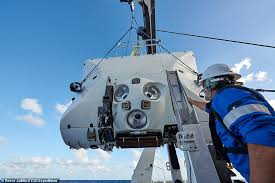
Breaking News
 China's Nightmarish New Bio Weapon Targets Race and Ethnicity
China's Nightmarish New Bio Weapon Targets Race and Ethnicity
 The Epstein Files Just EXPOSED the AI Mind Control Agenda (2026 Warning)
The Epstein Files Just EXPOSED the AI Mind Control Agenda (2026 Warning)
 Maxwell offers testimony if granted Trump clemency
Maxwell offers testimony if granted Trump clemency
 How RFK Jr's Guidelines Could Change Farming - Joel Salatin
How RFK Jr's Guidelines Could Change Farming - Joel Salatin
Top Tech News
 SpaceX Authorized to Increase High Speed Internet Download Speeds 5X Through 2026
SpaceX Authorized to Increase High Speed Internet Download Speeds 5X Through 2026
 Space AI is the Key to the Technological Singularity
Space AI is the Key to the Technological Singularity
 Velocitor X-1 eVTOL could be beating the traffic in just a year
Velocitor X-1 eVTOL could be beating the traffic in just a year
 Starlink smasher? China claims world's best high-powered microwave weapon
Starlink smasher? China claims world's best high-powered microwave weapon
 Wood scraps turn 'useless' desert sand into concrete
Wood scraps turn 'useless' desert sand into concrete
 Let's Do a Detailed Review of Zorin -- Is This Good for Ex-Windows Users?
Let's Do a Detailed Review of Zorin -- Is This Good for Ex-Windows Users?
 The World's First Sodium-Ion Battery EV Is A Winter Range Monster
The World's First Sodium-Ion Battery EV Is A Winter Range Monster
 China's CATL 5C Battery Breakthrough will Make Most Combustion Engine Vehicles OBSOLETE
China's CATL 5C Battery Breakthrough will Make Most Combustion Engine Vehicles OBSOLETE
 Study Shows Vaporizing E-Waste Makes it Easy to Recover Precious Metals at 13-Times Lower Costs
Study Shows Vaporizing E-Waste Makes it Easy to Recover Precious Metals at 13-Times Lower Costs
Visit the 'most exclusive destination on earth'... for £710k: Tourists offered the chance...

But for the first time, travellers are being offered the opportunity to explore its most extreme area - if they have a spare $750,000 (£710,000).
Isle of Man-based Eyos Expeditions is offering three members of the public the chance to tag along on a dive it's organising to the deepest spot in the Western Pacific trench, known as Challenger Deep - 35,853ft (10,928 metres/6.79 miles) beneath the surface. It is, the company says, the most exclusive destination on the planet.
The lucky three travellers will fly to the Pacific island of Guam. From there, they will board the expedition vessel, DSSV Pressure Drop, and spend a day at sea before reaching the Mariana Trench.
The expedition, which is set to take place in June, will then use a submersible vehicle called Limiting Factor to dive to the bottom of Challenger Deep.
The vehicle has been pressure-tested to 14,000 metres (45,931ft/8.69 miles) and has already dived to the bottom of the Mariana Trench five times.
Each guest will get an individual trip.
According to Eyos Expeditions, which has teamed up with Caladan Oceanic for the trip, the occupants of the submersible are completely protected by the 90mm-thick titanium sphere and 'experience no pressure changes or physiological stresses at all'.

 Smart dust technology...
Smart dust technology...

